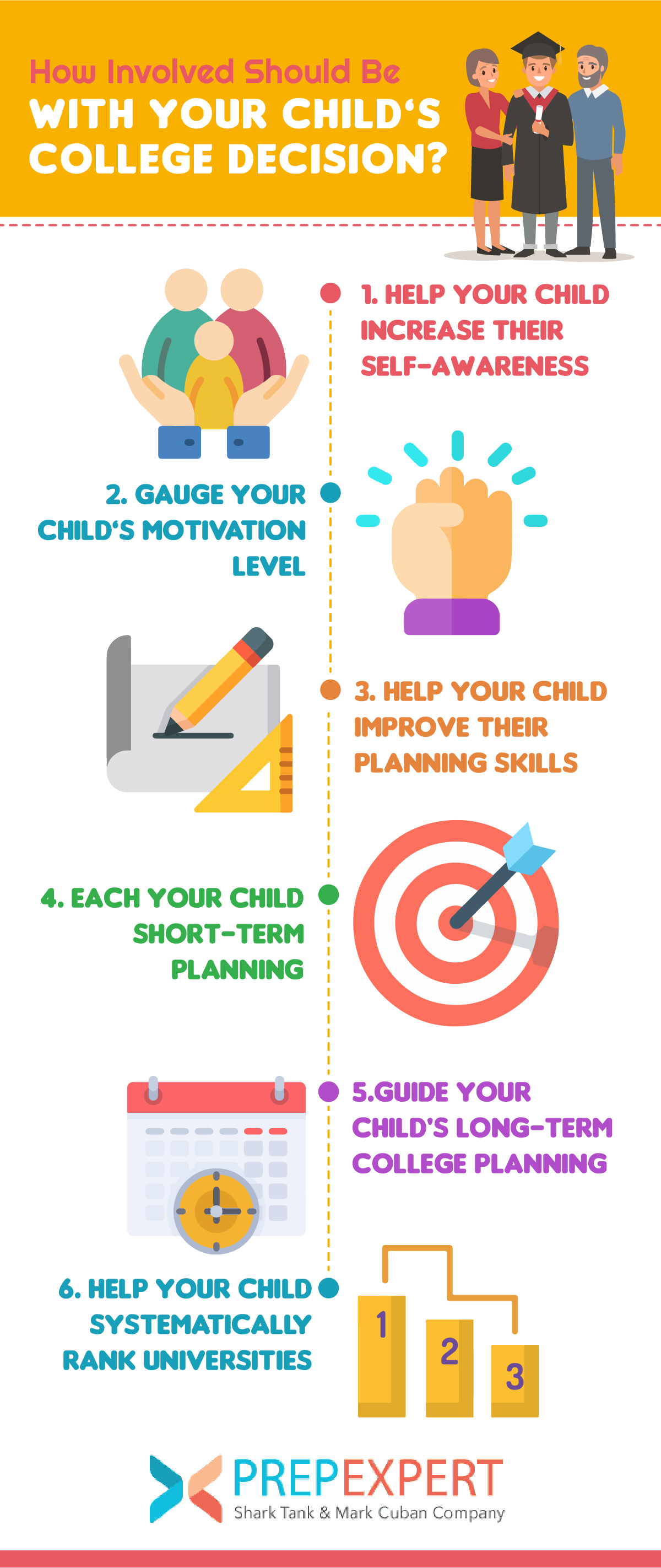How Involved Should You Be With Your Child’s College Decision?
For parents, involvement in their son or daughter’s college choice can be an emotionally exhausting tug of war between two extremes. Some parents stay out of the way, wanting their child to own the decision. Other parents push their child towards a particular university, afraid their child will never find a good fit on his or her own.
If you think of choosing a college as a skill set, it will help you demystify your role in your child’s choice. If you focus on teaching your child the skills necessary to make this decision – self-awareness, motivation, planning, and decision-making – your opinion will carry weight while as the decision is made.
The recommendations below will help you understand your role in guiding your child to his or her ideal university. In addition, Prep Expert’s SAT and ACT courses can help your child gain acceptance to that ideal university by boosting his or her standardized test scores.


Help Your Child Increase Their Self-Awareness
Many high school students falsely believe they can’t get into their ideal university because their test scores aren’t high enough.
Your child might not have the self-awareness to look at an ACT or SAT score and think, “I’m not going to let that hold me back.” The fact is that your son or daughter’s actual academic potential is probably higher than his or her test scores show. It has been shown time and again that preparation for these tests, such as what Prep Expert provides, can greatly increase a student’s score.
Because high school students don’t have much experience with standardized tests, they don’t know that it is common for adults entering a career to have to study for six months or more to take a licensing exam or entrance exam. One way you can influence your child’s choice is to increase your child’s options by helping him or her prepare for the SAT or ACT through Prep Expert.

Gauge Your Child’s Motivation Level
Sit down with your child to assess his or her motivation, so you know where to inspire him or her.
Pay attention to what he or she says about desires for a social life, intellectual life, career pursuits, and financial goals. You need to help your son or daughter develop the necessary motivation to choose the best university. Don’t be afraid that your involvement will cause your child’s motivation to be artificial.
People often have to fake motivation until they can truly grasp it. Going to the gym is a perfect example because people often don’t feel like going until they actually get there and start working out. In a similar manner, a parent may need to jump-start a son or daughter’s motivation.
First, assess your child’s current motivation level. Schedule a relaxing evening with them. Perhaps take your child out to a favorite restaurant or coffee shop where you can have a private conversation, without making it feel like a lecture. Take the stance of an active listener during this conversation, ask questions, and try not to give advice since your goal is to listen.
You might want to open up the conversation by asking about your child’s high school experience. Ask about what he or she found most valuable there. Transition the conversation so your child talks about what he or she wants out of a university. What you should be looking for are gaps in your child’s motivations. If your child has low motivation, then he or she won’t have the necessary buy-in to choose the best college.
A well-rounded set of motivations for choosing a university should include a desired social life, career choice options, academic rigor, geographical location, and financial goals. For example, if your child never talks about wanting to be intellectually challenged, you may have to provide that inspiration, or else your child may choose a university below their academic potential. A great way to do that is by visiting an intellectually challenging university.
Because things like inner drive are so personal, you will have to think of creative ways to expand your child’s motivation. These motivations will be revisited in a broader way below when long-term planning is discussed.

Help Your Child Improve Their Planning Skills
Many high school students have little experience making plans because their lives are scheduled by adults. They need help from parents to avoid failure.
[leadmagnet_five]
Benjamin Franklin is alleged to have said the famous words: “If you fail to plan, you plan to fail.” This is true nowhere more than in colleges and universities: according to College Atlas, 56 percent of students who start at a four-year university will drop out. This statistic illustrates a monumental failure in educational planning on a nationwide scale. Your child will need your guidance, so he or she can successfully plan and avoid becoming a statistic.
Avoid the temptation to take over your child’s college planning. Not only would planning be a lot of work, but your son or daughter needs to be the driving force behind it, in order to have a sufficient internal investment. High school students often have so little experience making and following through with plans. The more your son or daughter is involved in the planning process, the more it will feel like a practical exercise.

Teach Your Child Short-Term Planning Skills
Parents must be involved in teaching their children the short-term planning skills that are necessary for all the tasks associated with finding the right university.
Sharing in the short-term planning with your child is one of the most powerful ways you can influence college choice. If your son or daughter sees a give-and-take here, then he or she will naturally be open to visiting and researching your suggestions.
Short-term planning includes things like making and following a daily, weekly, and monthly schedule. You should share the planning duties with your child, but make sure he or she is doing most of the work.
Your child should be responsible for keeping a planner, including a calendar, for things like scheduling college visits, due dates for applications and scholarships, and meeting requirements for acceptance.

Guide Your Child’s Long-Term College Planning
Have your child write out what his or her ideal college experience would be like. Involve yourself by discussing it afterward and lending your insights.
Choosing a school is basically a long-term plan for four years. Students who don’t treat it this way may end up at a university that he or she would never intend on attending. It is appropriate for you to guide your son or daughter through this long-term planning. As with short-term planning, your involvement gives you an opportunity to influence the final decision.
Have your child write out a vision for what they want from the college experience in terms of social life, academics, location, career interests, and any other aspect that is personally valuable. Now is a great time to expand upon the motivations that were discussed earlier.
[leadmagnet_two]
Discuss your child’s ideal college experience with him or her. Now is the time to challenge your son or daughter where you see weaknesses or superficiality. Ask them probing questions such as, “What precisely do you mean by this?” The eventual goal is to help your child create a list of metrics to rank universities by.

Help Your Child Systematically Rank Universities
Help your son or daughter use the results from his or her long-term vision to rank universities and choose the best one.
Once your child knows what he or she is looking for in a university, have him or her simply assess each university according to their metrics. This should be done before your child visits campuses so you two have something to discuss during each visit. Your child may decide to give greater weight to some metrics. For instance, your child may want to attend a university that is in the top ten national rankings for computer science. This metric might be given a greater weight than social life.
You and your child should have a physical chart or table to rank the universities you are considering. This is another great opportunity for you to provide your insight and knowledge about what different universities provide. This chart can also help with some tricky situations that arise during the college search.
One such situation is that your son or daughter may be emotionally biased towards one school because he or she lives near it, follows its sports teams, or has friends there. An unbiased ranking system can help your child consider a broader spectrum of choices. It might be that your child’s favorite university isn’t really the best fit.
Another tricky situation is when a parent has a particular university that he or she wants a child to attend, but a child isn’t interested in. A good solution is to simply place that university onto the chart and evaluate it in an unbiased manner. Because the parents know a lot about that university, as would be the case with an alma mater, he or she can help the child to see the university’s advantages.
Successfully choosing an ideal university is the culmination of several smaller skills put into practice. The long and short of it is that parents can have the greatest influence over their child’s choice when they take the time to teach the skills of self-awareness, motivation, planning, and decision-making.
For more test strategy, college admissions, and scholarship application tips sign up for our FREE class happening right now!
Written by Dr. Shaan Patel MD MBA
Prep Expert Founder & CEO
Shark Tank Winner, Perfect SAT Scorer, Dermatologist, & #1 Bestselling AuthorMore from Dr. Shaan Patel MD MBA

Why Is The SAT Important?
It really seems like everything is important for today’s students, doesn’t it? From extracurriculars to the ever-increasing challenge of schoolwork,…

ACT Test Dates in 2025
If you’re planning on taking the ACT in 2025, you have several dates to choose from. This year, thanks to…
How MIT’s New Free Tuition Policy Is Leading a New Era of American Meritocracy in Higher Education
Massachusetts Institute of Technology (MIT) recently announced an inspiring policy: the school will now provide free college tuition for families…